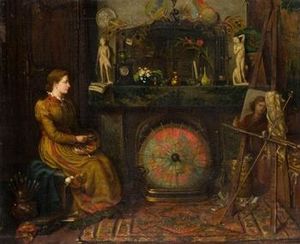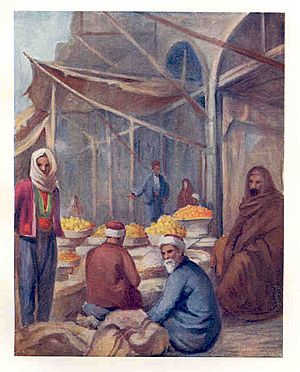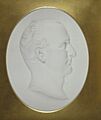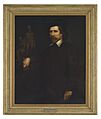Margaret Thomas facts for kids
Quick facts for kids
Margaret Thomas
|
|
|---|---|

Margaret Thomas, self-portrait, c.1881
|
|
| Born |
Margaret Cook
23 December 1842 Croydon, Surrey, England, UK
|
| Died | 24 December 1929 (aged 87) Norton, Hertfordshire, England, UK
|
| Nationality | British, Australian |
| Known for | Painting, sculpture, poetry, writing |
Margaret Thomas (born Margaret Cook; 1842–1929) was a talented artist, writer, and poet. She was born in Croydon, England, but later became an Australian citizen. Margaret was the daughter of Thomas Cook, who owned ships. She was known for her travel writing, poems, and beautiful artworks.
Contents
Becoming an Artist and Writer
Margaret Cook moved to Australia with her family in 1852. There, she began studying sculpture with a teacher named Charles Summers in Melbourne. In 1857, she showed a medallion portrait at the first art exhibition of the Victorian Society of Fine Arts. Margaret lived in Richmond, Victoria and often displayed her artwork.
Around 1867, Margaret traveled to Europe to continue her art studies. She had a medallion shown at the Royal Academy of Arts exhibition in 1868. After studying for three years in Rome, she earned a special scholarship at the Royal Academy in London. In 1872, she won a silver medal for her sculpture work.
Exhibitions and Early Writings
Between 1868 and 1880, Margaret Thomas showed her paintings, mostly portraits, at the Royal Academy. In 1880, she wrote a book about her first sculpture teacher, Charles Summers, called A Hero of the Workshop. That same year, she finished a sculpture of him for the shire hall in Taunton. She also created sculptures of other important people from Somerset.
Margaret started writing poems for different magazines. In 1888, a collection of Australian poems, Australian Poets, included seven of her works. It is also thought that Margaret painted many watercolors of the Middle East. These paintings often had a unique symbol: an upside-down L or Greek gamma (Γ) over a gothic M.
Travels and Later Books
In 1888, Margaret left England and traveled to Brittany, then to Rome. She was joined by her close friend and travel companion, Henrietta Pilkington (1848-1927). During the 1890s, they explored many places in the Middle East. Margaret's book, A Scamper through Spain and Tangier (1892), was dedicated to her "dear friend, the companion of these wanderings."
Both this book and Two Years in Palestine and Syria (1899) featured illustrations drawn by Margaret herself. In 1902, she published an interesting book called Denmark Past and Present. This was followed by How to Judge Pictures (1906) and a collection of her poems, A Painter's Pastime (1908).
In 1911, Margaret released what many consider her most important work, How to Understand Sculpture. After Henrietta Pilkington passed away in 1927, Margaret published another book of poems, Friendship, Poems in Memoriam. She also created many colorful illustrations for the book From Damascus to Palmyra by John Kelman (1908).
Margaret Thomas and Henrietta Pilkington moved to Norton, Hertfordshire in 1911. They lived in a cottage called Countryside. Margaret passed away there on December 24, 1929, the day after her 87th birthday. She was buried next to Henrietta Pilkington in Norton churchyard. Today, the North Hertfordshire Museum has several of Margaret's sculptures and 27 of her paintings. It also holds works by Henrietta Pilkington.
Margaret Thomas's Art in Australia
Margaret Thomas's painting of Charles Summers, created around 1879, was a very important piece. It was the first portrait of an Australian artist to be added to the National Gallery of Victoria collection. What's more, it was also the first oil painting by an Australian female artist that the National Gallery of Victoria bought, in 1881.
Margaret's oil portrait of Charles Summers and a medallion portrait of Sir Redmond Barry are kept in the historical collection at the State Library of Victoria in Melbourne.
Images for kids




